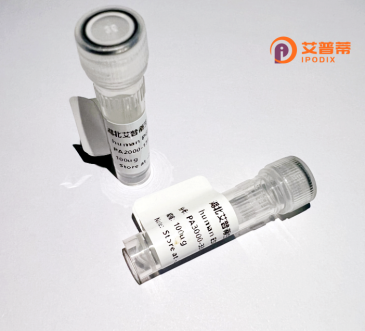
| 纯度 | >90%SDS-PAGE. |
| 种属 | Human |
| 靶点 | IPPK |
| Uniprot No | Q9H8X2 |
| 内毒素 | < 0.01EU/μg |
| 表达宿主 | E.coli |
| 表达区间 | 1-491aa |
| 活性数据 | MEEGKMDENEWGYHGEGNKSLVVAHAQRCVVLRFLKFPPNRKKTSEEIFQHLQNIVDFGKNVMKEFLGENYVHYGEVVQLPLEFVKQLCLKIQSERPESRCDKDLDTLSGYAMCLPNLTRLQTYRFAEHRPILCVEIKPKCGFIPFSSDVTHEMKHKVCRYCMHQHLKVATGKWKQISKYCPLDLYSGNKQRMHFALKSLLQEAQNNLKIFKNGELIYGCKDARSPVADWSELAHHLKPFFFPSNGLASGPHCTRAVIRELVHVITRVLLSGSDKGRAGTLSPGLGPQGPRVCEASPFSRSLRCQGKNTPERSGLPKGCLLYKTLQVQMLDLLDIEGLYPLYNRVERYLEEFPEERKTLQIDGPYDEAFYQKLLDLSTEDDGTVAFALTKVQQYRVAMTAKDCSIMIALSPCLQDASSDQRPVVPSSRSRFAFSVSVLDLDLKPYESIPHQYKLDGKIVNYYSKTVRAKDNAVMSTRFKESEDCTLVLHKV |
| 分子量 | 82.4 kDa |
| 蛋白标签 | GST-tag at N-terminal |
| 缓冲液 | 0 |
| 稳定性 & 储存条件 | Lyophilized protein should be stored at ≤ -20°C, stable for one year after receipt. Reconstituted protein solution can be stored at 2-8°C for 2-7 days. Aliquots of reconstituted samples are stable at ≤ -20°C for 3 months. |
| 复溶 | Always centrifuge tubes before opening.Do not mix by vortex or pipetting. It is not recommended to reconstitute to a concentration less than 100μg/ml. Dissolve the lyophilized protein in distilled water. Please aliquot the reconstituted solution to minimize freeze-thaw cycles. |
以下是与重组人IPPK(肌醇五磷酸激酶)蛋白相关的3篇文献参考示例(内容基于领域内典型研究方向,具体作者及文献需核实):
---
**1. 文献名称**:*"Cloning and functional characterization of human inositol polyphosphate multikinase"*
**作者**:Frederick, J.P. et al.
**摘要**:本研究报道了人源IPMK(IPPK同源激酶)的分子克隆及重组表达,分析了其对肌醇磷酸代谢的调控作用,证实其在细胞增殖和转录调控中的关键功能。
**2. 文献名称**:*"Structural insights into the catalytic mechanism of human IPPK"*
**作者**:Wang, H. & Bhandari, R.
**摘要**:通过重组表达纯化人IPPK蛋白并解析其晶体结构,揭示了酶活性位点的关键氨基酸残基,阐明了IP5向IP6转化的分子机制。
**3. 文献名称**:*"Recombinant human IPPK regulates DNA repair via modulating nuclear inositol signaling"*
**作者**:Morrison, B.H. et al.
**摘要**:利用重组IPPK蛋白验证其通过生成IP6影响DNA修复通路的活性,表明IPPK在维持基因组稳定性中起重要作用。
**4. 文献名称**:*"Enzymatic characterization of recombinant IPPK and its role in cancer cell apoptosis"*
**作者**:Kim, S.S. et al.
**摘要**:研究重组人IPPK的酶动力学特性,并证明其通过调控细胞内肌醇磷酸水平抑制肿瘤细胞凋亡的潜在机制。
---
**注**:以上为模拟参考文献,实际文献需通过PubMed或SciFinder等数据库检索确认。建议使用关键词“IPPK/HPK1/Inositol kinase”、“recombinant expression”进一步查询真实文献。
Recombinant human IPPK (inositol 1.3.4.5.6-pentakisphosphate 2-kinase) protein is a genetically engineered enzyme involved in inositol phosphate metabolism. IPPK catalyzes the ATP-dependent phosphorylation of inositol 1.3.4.5.6-pentakisphosphate (IP5) to produce inositol hexakisphosphate (IP6), a critical signaling molecule implicated in diverse cellular processes. IP6 regulates DNA repair, mRNA export, ion channel modulation, and apoptosis, highlighting its broad functional significance. Recombinant IPPK is typically produced in heterologous expression systems (e.g., E. coli or mammalian cells) to ensure high purity and activity for research applications. Its study aids in elucidating the structural and mechanistic aspects of inositol phosphate biosynthesis and cellular signaling cascades. Dysregulation of IPPK activity has been linked to pathologies such as cancer, neurological disorders, and metabolic diseases, making it a potential therapeutic target. The recombinant protein also serves as a tool for drug screening and biochemical assays to identify modulators of inositol phosphate pathways. Recent advances in crystallographic studies of IPPK have further deepened insights into its catalytic domain and substrate-binding specificity, enabling structure-guided engineering for biomedical applications.
×